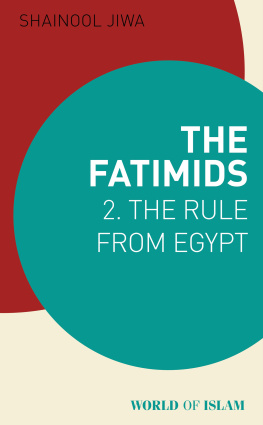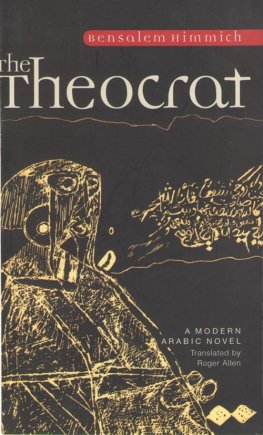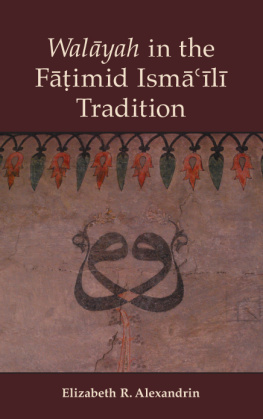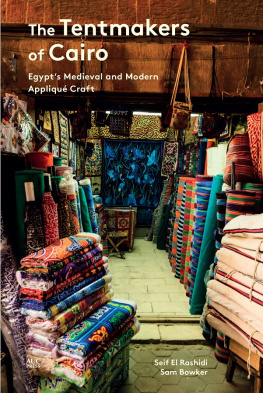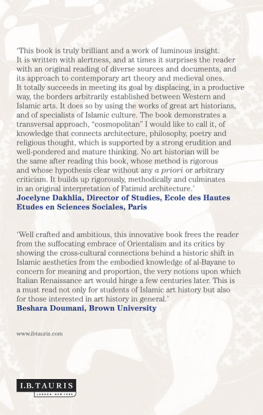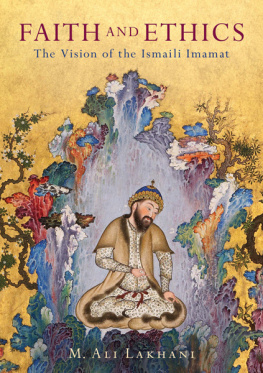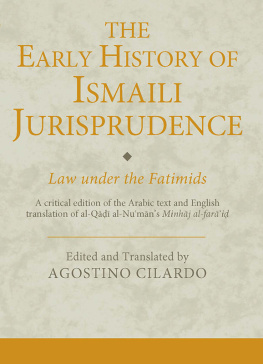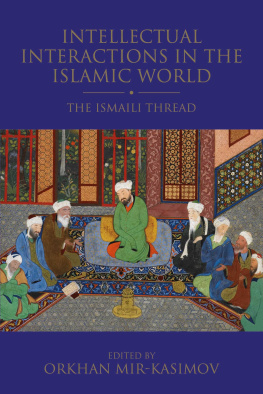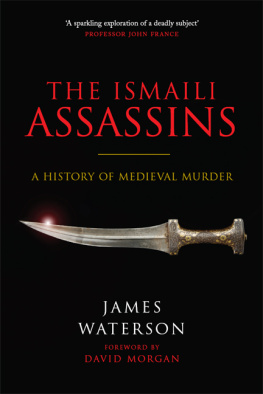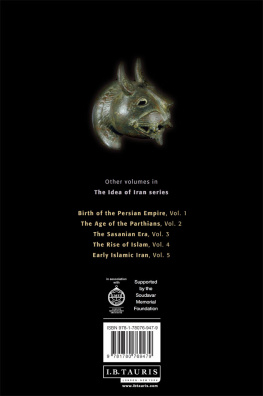THE FOUNDER OF CAIRO
The Institute of Ismaili Studies
Ismaili Texts and Translations Series, 21
Editorial Board: Farhad Daftary (general editor), Wilferd Madelung (consulting editor), Nader El-Bizri, Heinz Halm, Abbas Hamdani, Hermann Landolt, Mehdi Mohaghegh, Roy Mottahedeh, Azim Nanji, Ismail K. Poonawala, Ayman F. Sayyid, Paul E. Walker
Previously published titles:
1 . Ibn al-Haytham. The Advent of the Fatimids: A Contemporary Shii Witness. An edition and English translation of Ibn al-Haythams Kitb al-Munart, by Wilferd Madelung and Paul E. Walker (2000).
2 . Muammad b. Abd al-Karm al-Shahrastn. Struggling with the Philosopher: A Refutation of Avicennas Metaphysics. A new Arabic edition and English translation of al-Shahrastns Kitb al-Muraa, by Wilferd Madelung and Toby Mayer (2001).
3 . Jafar b. Manr al-Yaman. The Master and the Disciple: An Early Islamic Spiritual Dialogue. Arabic edition and English translation of Jafar b. Manr al-Yamans Kitb al-lim wal-ghulm, by James W. Morris (2001).
4 . Idrs Imd al-Dn. The Fatimids and their Successors in Yaman: The History of an Islamic Community. Arabic edition and English summary of Idrs Imd al-Dns Uyn al-akhbr, vol. 7, by Ayman F. Sayyid, in collaboration with Paul E. Walker and Maurice A. Pomerantz (2002).
5 . Nar al-Dn s. Paradise of Submission: A Medieval Treatise on Ismaili Thought. A new Persian edition and English translation of Nar al-Dn ss Rawa-yi taslm, by S. J. Badakhchani with an introduction by Hermann Landolt and a philosophical commentary by Christian Jambet (2005).
6 . al-Q al-Numn. Founding the Fatimid State: The Rise of an Early Islamic Empire. An annotated English translation of al-Q al-Numns Iftit al-dawa, by Hamid Haji (2006).
7 . Idrs Imd al-Dn. Uyn al-akhbr wa-funn al-thr. Arabic critical edition in 7 volumes by Ahmad Chleilat, Mahmoud Fakhoury, Yousef S. Fattoum, Muhammad Kamal, Mamoun al-Sagherji and Ayman F. Sayyid (20072012).
8 . Amad b. Ibrhm al-Naysbr. Degrees of Excellence: A Fatimid Treatise on Leadership in Islam. A New Arabic Edition and English Translation of al-Naysbrs Ithbt al-imma, by Arzina Lalani (2009).
9 . amd al-Dn Amad b. Abd Allh al-Kirmn. Master of the Age: An Islamic Treatise on the Necessity of the Imamate. A critical edition of the Arabic text and English translation of amd al-Dn Amad b. Abd Allh al-Kirmns al-Mab f ithbt al-imma, by Paul E. Walker (2007).
10 . Orations of the Fatimid Caliphs: Festival Sermons of the Ismaili Imams. An edition of the Arabic texts and English translation of Fatimid khubas, by Paul E. Walker (2009).
11 . Taq al-Dn Amad b. Al al-Maqrz. Towards a Shii Mediterranean Empire: Fatimid Egypt and the Founding of Cairo. The reign of the Imam-caliph al-Muizz, from al-Maqrzs Itti al-unaf bi-akhbr al-aimma al-Fimiyyn al-khulaf, translated by Shainool Jiwa (2009).
12 . Taq al-Dn Amad b. Al al-Maqrz. Itti al-unaf bi-akhbr al-aimma al-Fimiyyn al-khulaf. Arabic critical edition in 4 volumes, with an introduction and notes by Ayman F. Sayyid (2010).
13 . Nar al-Dn s. Shii Interpretations of Islam: Three Treatises on Theology and Eschatology. A Persian edition and English translation of Nar al-Dn ss Tawall wa tabarr, Malb al-muminn and ghz wa anjm, by S. J. Badakhchani (2010).
14 . al-Muayyad al-Shrz. Mount of Knowledge, Sword of Eloquence: Collected Poems of an Ismaili Muslim Scholar in Fatimid Egypt. A translation from the original Arabic of al-Muayyad al-Shrzs Dwn, translated by Mohamad Adra (2011).
15 . Amad b. Ibrhm al-Naysbr. A Code of Conduct: A Treatise on the Etiquette of the Fatimid Ismaili Mission. A critical Arabic edition and English translation of Amad b. Ibrhm al-Naysbrs Risla al-mjaza al-kfiya f db al-dut, by Verena Klemm and Paul E. Walker with Susanne Karam (2011).
16 . Manr al-Azz al-Jawdhar. Inside the Immaculate Portal: A History from Early Fatimid Archives. A new edition and English translation of Manr al-Azz al-Jawdhars biography of al-Ustdh Jawdhar, the Srat al-Ustdh Jawdhar, edited and translated by Hamid Haji (2012).
17 . Nir-i Khusraw. Between Reason and Revelation: Twin Wisdoms Reconciled. An annotated English translation of Nir-i Khusraws Kitb-i Jmi al-ikmatayn, translated by Eric Ormsby (2012).
18 . al-Q al-Numn. The Early History of Ismaili Jurisprudence: Law under the Fatimids. An Arabic edition and English translation of al-Q al-Numns Kitb minhj al-farid, edited and translated by Agostino Cilardo (2012).
19 . tim b. Ibrhm al-mid. The Precious Gift of the Hearts and Good Cheer for Those in Distress. On the Organisation and History of the Yaman Fatimid Dawa. A critical edition of the Arabic text and summary English translation of tim b. Ibrhm al-mids Tufat al-qulb wa furjat al-makrb, by Abbas Hamdani (2012).
20 . Ab hir Isml al-Manr billh. The Shii Imamate: A Fatimid Interpretation. An Arabic edition and English translation of al-Manrs Tathbt al-imma attributed to Ab hir Isml al-Manr billh, by Sami Makarem (2013).
The Institute of Ismaili Studies
The Institute of Ismaili Studies was established in 1977 with the object of promoting scholarship and learning on Islam, in the historical as well as contemporary contexts, and a better understanding of its relationship with other societies and faiths.
The Institutes programmes encourage a perspective which is not confined to the theological and religious heritage of Islam, but seeks to explore the relationship of religious ideas to broader dimensions of society and culture. The programmes thus encourage an interdisciplinary approach to the materials of Islamic history and thought. Particular attention is also given to issues of modernity that arise as Muslims seek to relate their heritage to the contemporary situation.
Within the Islamic tradition, the Institutes programmes promote research on those areas which have, to date, received relatively little attention from scholars. These include the intellectual and literary expressions of Shiism in general, and Ismailism in particular.
In the context of Islamic societies, the Institutes programmes are informed by the full range and diversity of cultures in which Islam is practised today, from the Middle East, South and Central Asia, and Africa to the industrialised societies of the West, thus taking into consideration the variety of contexts which shape the ideals, beliefs and practices of the faith.
These objectives are realised through concrete programmes and activities organised and implemented by various departments of the Institute. The Institute also collaborates periodically, on a programme-specific basis, with other institutions of learning in the United Kingdom and abroad.
The Institutes academic publications fall into a number of interrelated categories:


